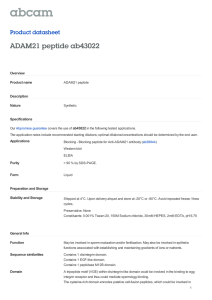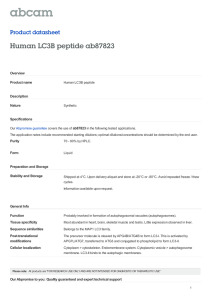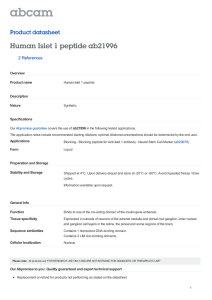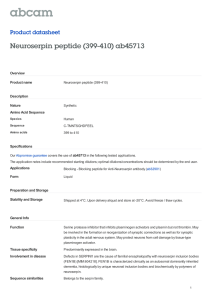Human C Peptide peptide ab103921 Product datasheet Overview Product name
advertisement
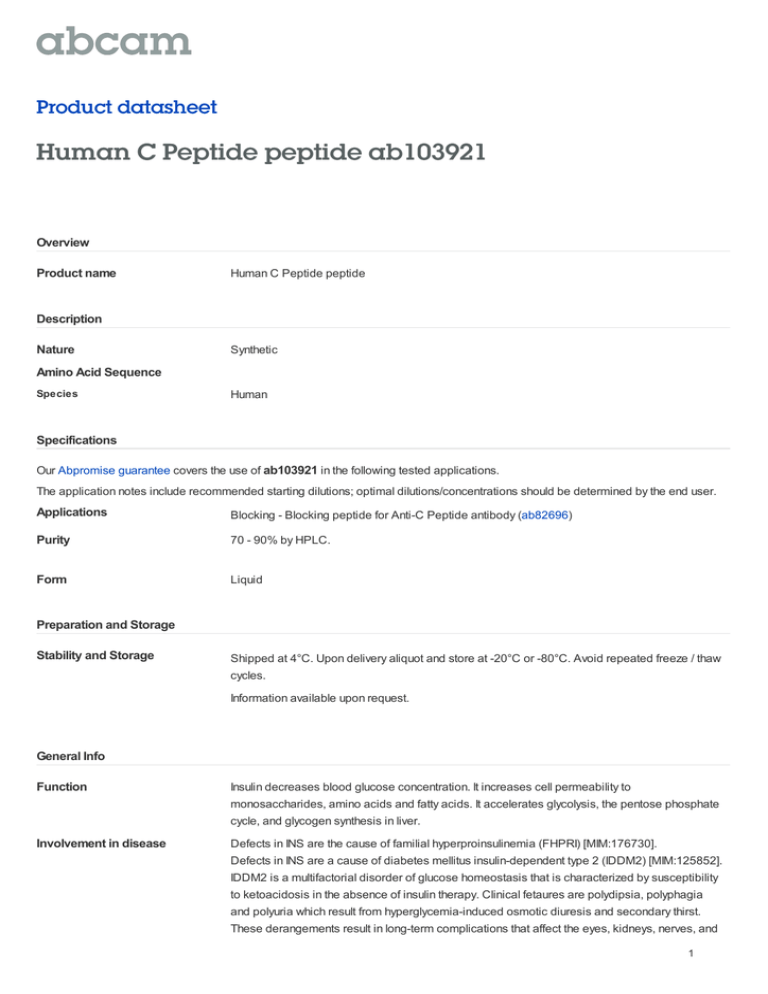
Product datasheet Human C Peptide peptide ab103921 Overview Product name Human C Peptide peptide Description Nature Synthetic Amino Acid Sequence Species Human Specifications Our Abpromise guarantee covers the use of ab103921 in the following tested applications. The application notes include recommended starting dilutions; optimal dilutions/concentrations should be determined by the end user. Applications Blocking - Blocking peptide for Anti-C Peptide antibody (ab82696) Purity 70 - 90% by HPLC. Form Liquid Preparation and Storage Stability and Storage Shipped at 4°C. Upon delivery aliquot and store at -20°C or -80°C. Avoid repeated freeze / thaw cycles. Information available upon request. General Info Function Insulin decreases blood glucose concentration. It increases cell permeability to monosaccharides, amino acids and fatty acids. It accelerates glycolysis, the pentose phosphate cycle, and glycogen synthesis in liver. Involvement in disease Defects in INS are the cause of familial hyperproinsulinemia (FHPRI) [MIM:176730]. Defects in INS are a cause of diabetes mellitus insulin-dependent type 2 (IDDM2) [MIM:125852]. IDDM2 is a multifactorial disorder of glucose homeostasis that is characterized by susceptibility to ketoacidosis in the absence of insulin therapy. Clinical fetaures are polydipsia, polyphagia and polyuria which result from hyperglycemia-induced osmotic diuresis and secondary thirst. These derangements result in long-term complications that affect the eyes, kidneys, nerves, and 1 blood vessels. Defects in INS are a cause of diabetes mellitus permanent neonatal (PNDM) [MIM:606176]. PNDM is a rare form of diabetes distinct from childhood-onset autoimmune diabetes mellitus type 1. It is characterized by insulin-requiring hyperglycemia that is diagnosed within the first months of life. Permanent neonatal diabetes requires lifelong therapy. Defects in INS are a cause of maturity-onset diabetes of the young type 10 (MODY10) [MIM:613370]. MODY10 is a form of diabetes that is characterized by an autosomal dominant mode of inheritance, onset in childhood or early adulthood (usually before 25 years of age), a primary defect in insulin secretion and frequent insulin-independence at the beginning of the disease. Sequence similarities Belongs to the insulin family. Cellular localization Secreted. Please note: All products are "FOR RESEARCH USE ONLY AND ARE NOT INTENDED FOR DIAGNOSTIC OR THERAPEUTIC USE" Our Abpromise to you: Quality guaranteed and expert technical support Replacement or refund for products not performing as stated on the datasheet Valid for 12 months from date of delivery Response to your inquiry within 24 hours We provide support in Chinese, English, French, German, Japanese and Spanish Extensive multi-media technical resources to help you We investigate all quality concerns to ensure our products perform to the highest standards If the product does not perform as described on this datasheet, we will offer a refund or replacement. For full details of the Abpromise, please visit http://www.abcam.com/abpromise or contact our technical team. Terms and conditions Guarantee only valid for products bought direct from Abcam or one of our authorized distributors 2
